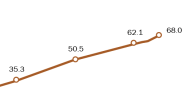Overview

The public continues to support tough measures to crack down on illegal immigration, but also a path to citizenship for those in the country illegally. A plurality (43%) says the priority should be better border security and enforcement, as well as creating a way for illegal immigrants to become citizens if they meet certain requirements. Fewer say the priority should only be better security and stronger enforcement of immigration laws (29%), or only creating a path to citizenship for illegal immigrants in the U.S. (24%). These opinions have not changed substantially over the past year.
Americans are evenly split over whether illegal immigrants who graduate from high school in their state should be eligible for in-state college tuition: 48% say they should be eligible for the in-state tuition rate, while 46% say they should not.
The national survey by the Pew Research Center for the People & the Press, conducted Nov. 9-14 among 2,001 adults finds continuing partisan differences over immigration policy. More than twice as many Republicans as Democrats say the priority for dealing with illegal immigration should only be better border security and stricter law enforcement (47% vs. 22%).
Yet there also are divisions within both parties’ coalitions over the overall priority for U.S. immigration policy and whether illegal immigrants should be eligible for in-state tuition.
There is a substantial age gap over immigration policies in opinions among Republicans and Republican-leaning independents. A majority (57%) of Republicans and GOP leaners 65 and older say border security and stricter enforcement alone should be the priority for immigration policy, while 24% favor a dual approach that would include a path to citizenship.

Among Republicans and GOP leaners younger than 30, 42% say the focus should be on tougher border security and enforcement along with a path to citizenship, while 30% say the priority should only be on better border security and stricter enforcement.
Republicans and Republican leaners who agree with the Tea Party are more likely than those who do not to say that better border security and stronger enforcement of immigration laws should be the priority (52% vs. 36%).

There also are differences among Democrats and independents who lean Democratic. About half of Hispanic Democrats and Democratic leaners (52%) say the priority should be to create a way for illegal immigrants already in the U.S. to become citizens if they meet certain requirements. Only about a quarter of non-Hispanic whites (27%) and African Americans (24%) agree.
Liberal Democrats and Democratic leaners favor a path to citizenship over stronger enforcement by more than two-to-one (37% vs. 15%) while conservative Democrats are divided (30% prioritize security and enforcement, 28% path to citizenship).
Public Split Over In-State Tuition for Illegal Immigrants

Nearly half of the public (48%) thinks an illegal immigrant who went to high school in their state and is accepted to a public college should be eligible for the in-state tuition rate, while 46% disagree.
About three-quarters of Hispanics (77%) say illegal immigrants should be eligible for in-state tuition, compared with 66% of non-Hispanic blacks and just 40% of non-Hispanic whites .
Most Republicans (63%) say illegal immigrants should not be eligible for in-state college tuition. By contrast, 56% of Democrats say they should be eligible. About half of independents (51%) favor in-state tuition for illegal immigrants while 44% are opposed.
About six-in-ten of those younger than 30 (61%) favor allowing illegal immigrants to be eligible for in-state tuition, compared with 38% of those 65 and older. And while there are no significant educational differences in these views, 58% of those with family incomes of less than $30,000 support this proposal, compared with 45% of those in households earning at least $75,000 a year.

The internal divisions in both parties over immigration policy priorities are generally reflected in opinions about in-state college tuition for illegal immigrants.
Republicans and Republican leaners are divided by age and income. Two-thirds (68%) of Republicans 65 and older say illegal immigrants should not be eligible for in-state college tuition; just 24% say they should be eligible. Republicans under 30 are divided (48% say they should be eligible, 48% say they should not). Republicans with higher family incomes are more opposed to this proposal than are those with family incomes of less than $30,000.
Nearly three-quarters of Republicans who agree with the Tea Party (74%) say illegal immigrants should not be eligible for in-state tuition. Among Republicans who do not agree with the Tea Party movement, fewer (52%) oppose in-state tuition for illegal immigrants.
Among Democrats and Democratic-leaning independents, fully 82% of Hispanics think an illegal immigrant should be eligible for in-state tuition. Smaller majorities of non-Hispanic blacks (65%) and whites (51%) agree. Two-thirds (66%) of Democrats younger than 30 favor in-state tuition for illegal immigrants, compared with 54% of those 50 and older.




